Imagine a tiny piece of engineering wonder that packs a punch in both performance and affordability—the SG90 servo motor. Whether you’re a hobbyist building your first robot, an educator introducing students to robotics, or an engineer designing compact automation solutions, understanding the value and cost of this tiny dynamo can make or break your project.

The Allure of the SG90
The SG90 servo motor has earned its reputation as the go-to choice for countless DIY projects, educational kits, and prototype designs. Its popularity isn’t just due to its diminutive size but also its impressive blend of flexibility, precision, and price point. With a compact form factor, typically measuring around 22.8 x 12.2 x 23.8 millimeters, this servo can easily fit into tight spaces—an essential trait for compact robotics and embedded systems.
It delivers a torque of approximately 1.8 kg/cm at 4.8V—enough power to move small arms, wheels, or sensors with reasonable accuracy. Its speed ranges from 0.1 to 0.2 seconds per 60 degrees of rotation. For hobbyists and learners, these specs provide a perfect balance—they're powerful enough for engaging projects but not overwhelming or complicated to control.
Why Is the SG90 So Popular?
One word: affordability. The SG90 servo is widely considered one of the most budget-friendly actuators available today. Its low cost makes it accessible for individuals, classrooms, and small startups looking to prototype or explore robotics without heavy investment. Despite its low price, it maintains a decent level of reliability and performance, especially when used within its operational parameters.
Additionally, the SG90’s simple design and widespread availability mean that replacement and maintenance are straightforward. Its popularity has resulted in a robust ecosystem of tutorials, project ideas, and compatible components, making it the perfect starting point for beginners venturing into automation.
What Drives the Cost of the SG90 Servo Motor?
While the price might seem straightforward—generally ranging from $1.50 to $5 in bulk or retail—delving deeper into what influences this cost reveals intriguing insights about manufacturing, market dynamics, and technological trade-offs.
1. Manufacturing Scale and Material Quality
High-volume production lines mean that the basic components—gears, motors, circuit boards—are produced en masse, leading to lower per-unit costs. The materials used, often plastic gears and modest motors, are chosen to optimize cost without severely compromising function. However, this does mean the SG90 is designed more for light-duty applications rather than heavy, sustained use.
2. Design Simplicity
The SG90’s straightforward design contributes significantly to its affordability. It doesn’t include elaborate features like feedback circuits, multiple selectable gears, or waterproof housings—features found in more advanced servos. This simplicity minimizes manufacturing complexity and reduces costs.
3. Market Competition
A competitive market floods the industry with clones and compatible versions, which drives prices down further. Brands like TowerPro have established dominance by offering reliable versions at unbeatable prices. As a result, consumers benefit from a thriving ecosystem of options.
4. Distribution and Supply Chain
Bulk procurement and efficient logistics have further cut costs. Many suppliers offer the SG90 at low prices because of high demand and fast turnover. Online marketplaces like AliExpress, Amazon, and specialty electronics distributors have made it easy to access affordable options worldwide.
How Price Variation Affects Project Planning
Understanding the price range of the SG90 is crucial for project budgets. For individual hobbyists or students, purchasing individual units at around $2 to $4 is typical. For larger scale projects involving multiple servos—say, a robotic arm with five or six joints—the per-unit price might drop even further with bulk purchasing, often below $2.
However, while the low cost is enticing, it’s important to recognize that not all SG90s are created equal. Some cheaper clones may sacrifice durability or precision, leading to potential issues down the line. Conversely, investing a few extra cents on a branded or reviewed version can ensure better longevity and performance.
The Hidden Costs
While the initial price is low, it’s wise to consider some ancillary costs:
Power supply: Many don’t realize that an appropriate power source is essential. Using a stable 4.8V to 6V power supply prevents glitches and extends lifespan. Control hardware: A microcontroller (like Arduino, Raspberry Pi, or similar) is needed for operation. The cost of the controller itself impacts the overall project budget. Accessory components: Horns, brackets, connectors, and mounting hardware add to the total expense but are often overlooked when just considering the servo itself.
The Role of Quality in Cost
Since the SG90 is often the first introduction to servos for many, the question of quality versus cost comes into play. Cheaper, no-name clones may save money upfront but might suffer from inconsistent movement, noise, or premature failure. Conversely, purchasing a slightly more reputable or tested unit—often still below $5—can provide peace of mind and more reliable operation.
That’s where we’ll pause for now. In the second part, I’ll explore how advancements in manufacturing and technology have impacted the SG90’s price, delve into comparing it with other servo types, and provide tips on selecting the best servo for your specific project needs.
Leveraging innovations in modular drive technology, Kpower integrates high-performance motors, precision reducers, and multi-protocol control systems to provide efficient and customized smart drive system solutions.




































